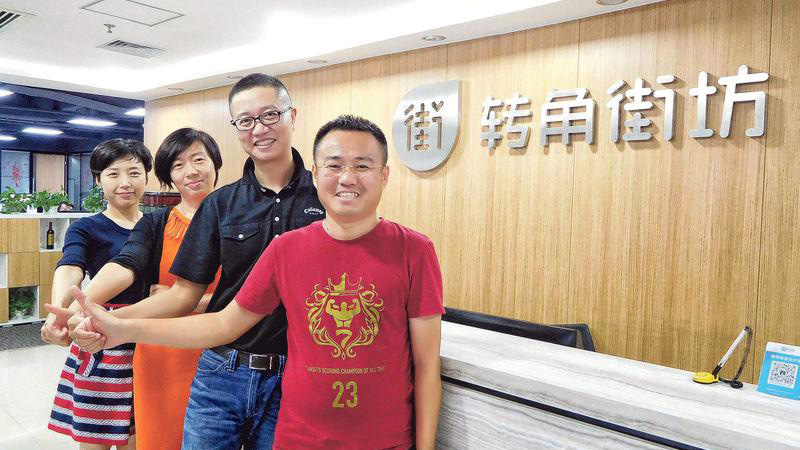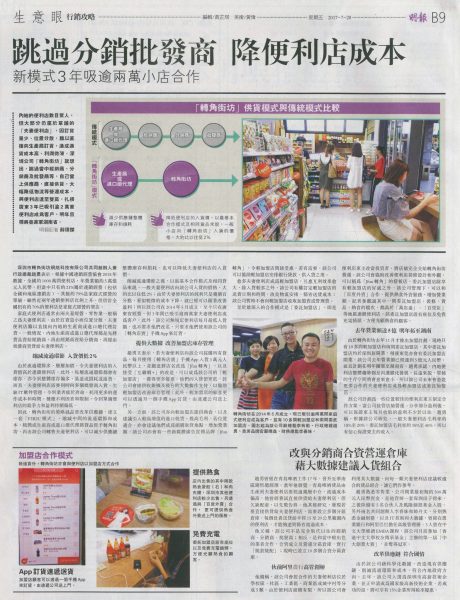Optimising the Supply Chain for Domestic Convenience Stores in China

Founded by four The Chinese University of Hong Kong (CUHK) Business School alumni, Shenzhen Jfun Technology Co. Ltd has introduced a new F2B2C model for single domestic convenience stores to boost their profits and competitiveness in China. Find out more in a news report published in Ming Pao Daily News.
There are a plethora of convenience store outlets in mainland China, and the majority of them are single domestic convenience stores. Due to their small order quantity and scattered locations, it is hard for them to order from the suppliers directly, leading to high operating costs and low profit margins. To reach a win-win situation with these stores, Shenzhen Jfun Technology Co.Ltd (Jfun) has streamlined the purchasing process – skipping the intermediaries and taking the supplier role itself.
Jfun is co-founded by EMBA (Chinese) alumni Zhao Yong, Li Chunmei, Shuai Danwen and BBA alumnus Xu Zinan of The Chinese University of Hong Kong Business School. It was also the champion team in the first CUHK Entrepreneurship Competition held in May 2017, and signed a Memorandum of Understanding (MoU) with three alumni investors.
In the past, single domestic convenience stores suffered from high purchase costs owing to the multi-layered supply chain. They also faced the problem of stock piling given the lack of support in inventory management and ordering from multiple suppliers. After Jfun reformed the supply chain to F2B2C, single domestic convenience stores can save 2 percent of purchase costs in general if they order through Jfun’s B2B mobile ordering app.
Rooted in Guangdong, Jfun has attracted over 20,000 convenience store outlets to be its clients in the past three years. After introducing the franchising plan last November, it has more than ten light franchise stores and two commissioned franchise stores. Its revenue reached 500 million yuan last year, and is planning to expand into Hunan Province next year.
In an interview with Ming Pao Daily News, co-founder and CEO of Jfun Zhao Yong explained that light franchise stores are those which place orders of 30 thousand yuan per month, change their store name to “JFun” and accept the store remake by “Internet+”. They are offered further lowered product costs, cashier machines and big data, courier services, ready-to-serve food, brand advertising, loans and more.
On the other hand, for commissioned franchise stores, a store operator becomes an investor and hands in the operation to Jfun completely. Not only can they share the benefits enjoyed by light franchise stores, but they can also receive assistance in interior design and cooperate with Baidu Takeaway to boost sales.
The company is planning to cooperate with convenience store operators in advantageous locations. When the company takes over the store operations and shares part of its profits, it is guaranteed that the owner would not be worse off in his monthly profits. Zhao said, according to the research of China Chain Store and Franchise Association, the gross profit margin of single domestic convenience stores is about 18 percent to 20 percent, and that of commissioned franchise stores is about 35 percent to 40 percent, so he is confident in guaranteeing the income of store operators.
Zhao admitted that overall trend is moving towards chain convenience stores, and it will be increasingly difficult for single domestic convenience stores to survive. The company targets to persuade more of these stores to join their franchising alliance in the future.
Please click here (PDF) or the image below to read the full story written in Chinese.


